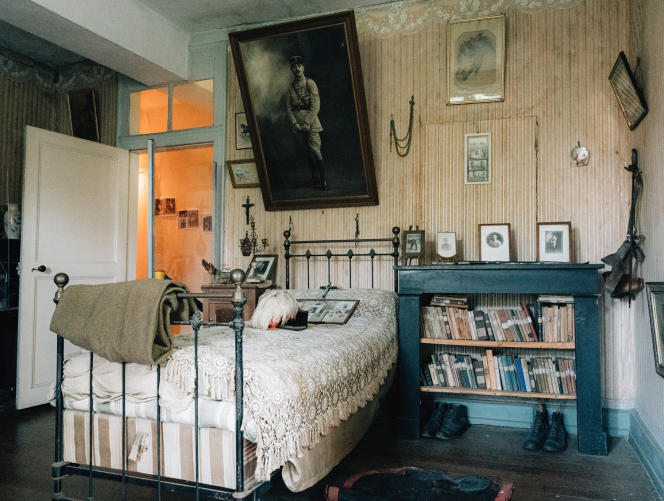“Don’t tell me I spoiled you, my darling child. I was severe. It was necessary to subdue the young colt full of sap but your training was very easy, my dear, we read in a notebook taken at random near the cupboard. In the room of Second Lieutenant Hubert Rochereau, born in Bélâbre, in Indre, on October 18, 1896 and died in combat on April 25, 1918, his correspondence with his parents, clothes, an opium pipe, a pack of English cigarettes too. All that the soldier engaged on the western front brought back with each leave. Then he died, killed by shrapnel in the head, at 21 years old. His parents never got over it.
This room with a view of a withered rose garden has become a kind of private mausoleum, in homage to an adored only child: for a time, the parents even laid a mannequin on his bed, dressed in his real clothes. And since then, nothing, not a sheet, not a candle, has moved for a hundred and five years. This macabre incongruity comes from the respect by the successive occupants of clauses written before a notary by the parents of Hubert Rochereau when they want to part with their home: leave the room as it is for five hundred years or “get rid of it by pulverizing it” and never have a house party. Nothing that could disturb the contemplation.
The house is first bequeathed to the Society of Members of the Legion of Honor, which does not want it. Then it was given to General Eugène Bridoux, a friend of the family, in 1935. In 1940, in occupied France, General Bridoux was appointed Secretary of State for War in the Vichy government. At the end of the war, the man fled to Franco’s Spain, where he remained until his death in 1955. In 1948, he was sentenced to death in absentia and his house was confiscated.
A preserved sanctuary
Entrusted to a notary, it will eventually be bought by Daniel Fabre, the husband of General Bridoux’s daughter. In 1983, the owner opened the door of the room, which had been condemned until then, and showed it to local notables. All agree to keep the place as it is, but quietly. The existence of this sanctuary was nevertheless revealed in 2014, in an article of The New Republic, then in the British daily The Guardian which caused a stir. Japanese people inquire about organizing a wedding in this house. But the room remains closed and the global buzz subsides.
In May 2021, a couple of Parisians and their four children acquired this building to make it their holiday home. The mother, Blandine (who wished to remain anonymous), is a notary. “Five hundred years was a totally illegal clause… especially since there was no legitimate and serious reason”, she says. The room is dilapidated, the moths feast. Some of Private Rochereau’s tunics are in tatters.
You have 44.43% of this article left to read. The following is for subscribers only.
